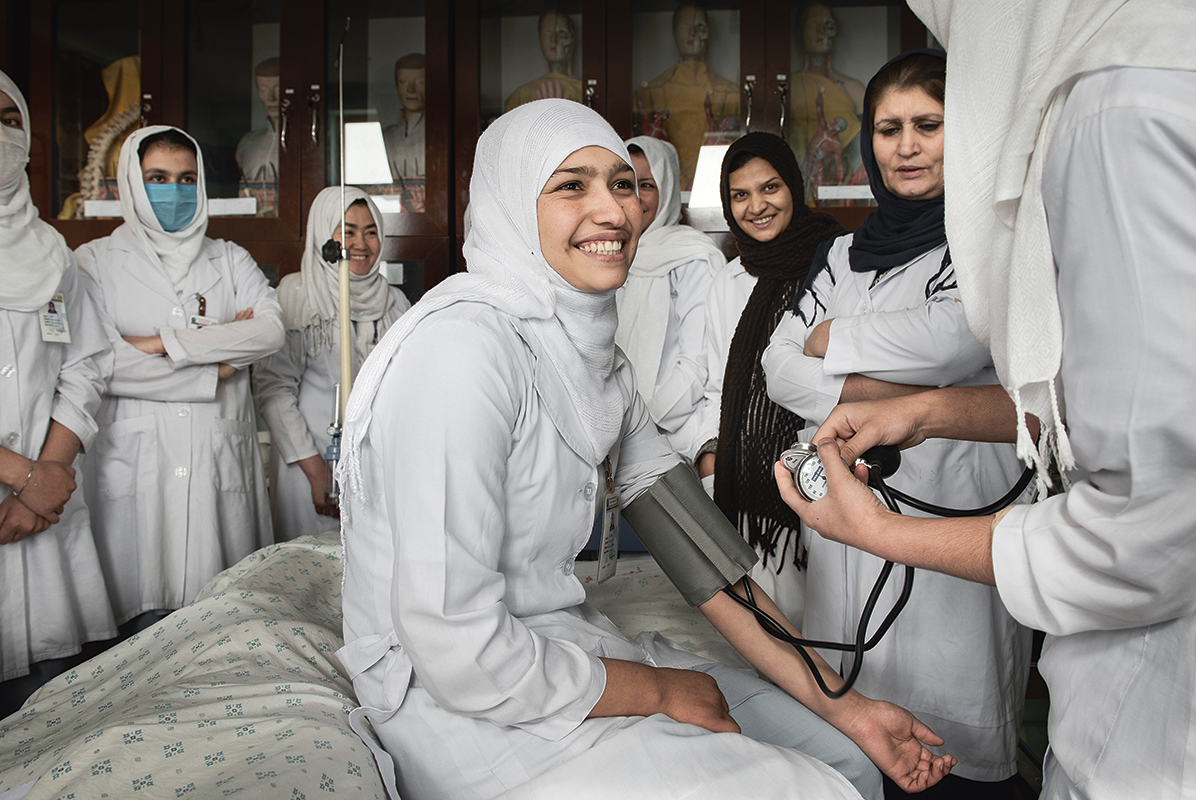“My dream is to work with helping the poor”
Rohawza Ahmadi is 19 years old and attends SCA’s nursing training program in the province of Wardak. There is a demand for female nurses as many women in Afghanistan are still not allowed to receive medical treatment from male health professionals.

Two years have passed since SCA launched a nursing training program in the province of Wardak, west of the Afghan capital of Kabul. Together with Laghman in the eastern part of the country, Wardak is one of the provinces where the Afghan state has tasked SCA with providing healthcare for the
citizens.
In a country where women in some areas are still not allowed to receive care from male healthcare professionals, training more women is literally a matter of life or death. The training lasts for two years and includes a two-week internship at SCA’s hospital in the provincial capital of Maidan Shahr. When we visit, a PowerPoint presentation is projected on one of the walls in the classroom. The students repeat what they discussed in a previous lesson: the safe storage and handling of drugs and that some drugs may be addictive.
In the classroom, we find 25 young women aged 18–30 from different parts of Wardak. Many of them participate in the discussion and answer questions from the instructor. They all applied to the program after having received information about the program through advertisements on the radio, at health clinics and through village councils. It is in these village councils where it is decided which of the young women in the village will apply to the training program. The village councils also attest that the student is motivated.
Several of the students come from remote areas in rural areas characterized by a high level of poverty and insecurity. Fighting between the Taliban and government forces is not uncommon. It can sometimes take eight hours for the students to return home on weekends and holidays.
One can see in the women’s eyes that they are proud. They are building professional skills possessed by few others. There is no mistaking their wish to contribute to the development of society.
One of the students is Saleha Yousefi. She is 20 years old and just like many of her classmates, she is the first woman from her village training to become a nurse.
“I come from a very remote area that is very poor and insecure. I want to work hard for increasing public awareness regarding good health and improve access to healthcare in my village. Thanks to the training, I know that women have the same rights as men and that the men have to support us women,” says Saleha Yousefi.
Her classmate Rohawza Ahmadi, 19 years old, tells us why she wants to become a nurse:
“There are many very poor people where I live. They lack education and the nearest clinic is far away. My dream is to help them as a nurse, to see my community improve and develop. That would make me happy,” says Rohawza Ahmadi.
The women graduating from SCA’s nursing training program frequently return to their villages to work. After graduation, some also start working at private hospitals and clinics or at one of the healthcare facilities operated by SCA.
The nursing training program also contributes to changing norms and traditions. This is due to the fact that the young female students and graduated nurses become part of the public space, which has frequently been limited to men only.
At the school, next to the classroom on the ground floor, there is a lab with medical posters on the walls and microscopes on the tables. At the top of a staircase, by the rooftop terrace, there is a room with hospital gurneys, stethoscopes, skeletons and models of the inside of the body.
The cabinets along the walls are filled with equipment needed for the training, such as boxes with drugs and first aid kits. Here, the students practice on visits to a health clinic. They examine each other, ask how they feel, check heart rate and blood pressure.
The nursing students in Wardak know that they receive support from a land far away, from Sweden. They proudly and enthusiastically tell us what this means for them.
“This makes us feel that there is someone thinking about us and supporting us. That makes us even more motivated to carry on. Women, just like the men, must be allowed to get an education,” says Saleha Yousefi. Her classmates nod in agreement.
TEXT: Anna Ek
There are two schools that train nurses
In addition to providing basic care and assisting midwives with maternity care, the nurses also engage in preventive work by disseminating information on good hygiene practices.